
Reliant Motor Company was a British car manufacturer based in Tamworth, Staffordshire, England. It was founded in 1935 and ended car production in 2002, the company had been known as "Reliant Motor Company" until the 1990s when it became "Reliant Motors" and then finally became "Reliant Cars LTD" after production had ended of the Robin as the company was restructured to be a car import business. It is now a dormant company and the only entity left is a separate parts company created called "Reliant Partsworld" which produces parts for Reliant vehicles.
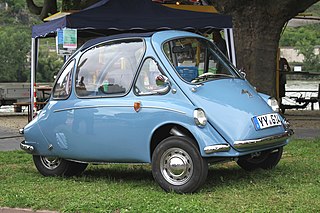
Microcar is a term often used for the smallest size of cars, with three or four wheels and often an engine smaller than 700 cc (43 cu in). Specific types of microcars include bubble cars, cycle cars, invacar, quadricycles and voiturettes. Microcars are often covered by separate regulations to normal cars, having relaxed requirements for registration and licensing.
Triumph Engineering Co Ltd was a British motorcycle manufacturing company, based originally in Coventry and then in Meriden. A new company, Triumph Motorcycles Ltd, based in Hinckley, gained the name rights after the end of the company in the 1980s and is now one of the world's major motorcycle manufacturers.
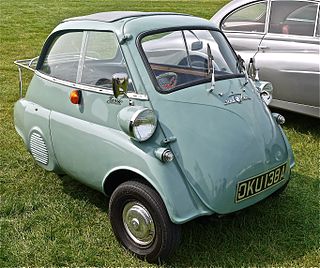
The Isetta is an Italian-designed microcar built under license in a number of different countries, including Argentina, Spain, Belgium, France, Brazil, Germany, and the United Kingdom. Because of its egg shape and bubble-like windows, it became known as a bubble car, a name also given to other similar vehicles.

A cyclecar was a type of small, lightweight and inexpensive motorized car manufactured in Europe and the United States between 1910 and the early 1920s. The purpose of cyclecars was to fill a gap in the market between the motorcycle and the car. It could accommodate only two passengers, often sitting in tandem.
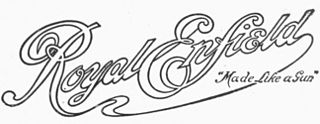
Royal Enfield was a brand name under which The Enfield Cycle Company Limited of Redditch, Worcestershire, England, sold motorcycles, bicycles, lawnmowers and stationary engines which it manufactured. Enfield Cycle Company also used the brand name "Enfield" without the "Royal". Later in 1994, Eicher Motors an Indian multinational automobile manufacturing company took over the company's full ownership.

Trojan was an automobile manufacturer and a Formula One constructor, in conjunction with Australian Ron Tauranac, from the United Kingdom.

Excelsior, based in Coventry, was a British bicycle, motorcycle and car maker. They were Britain’s first motorcycle manufacturer, starting production of their own ‘motor-bicycle’ in 1896. Initially they had premises at Lower Ford Street, Coventry, and 287-295 Stoney Stanton Road, Hillfields, Coventry, Warwickshire before moving to Kings Road, Tyseley, Birmingham in 1921.

The Peel P50 is a three-wheeled microcar originally made from 1962 to 1965 by the Peel Engineering Company on the Isle of Man, and then from 2010 to present. It was listed in the 2010 Guinness World Records as the smallest production car ever made. The original model has no reverse gear, but a handle at the rear allows the very lightweight car to be maneuvered physically when required.
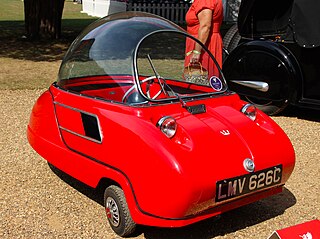
The Peel Trident is the second three-wheeled microcar built by the Peel Engineering Company on the Isle of Man. An all-new design from its one-seat counterpart the Peel P50, the Trident has two seats.

The Commuter Cars Tango is a prototype ultra-narrow electric sports car designed and built by Commuter Cars, an electric car company based in Spokane, Washington.
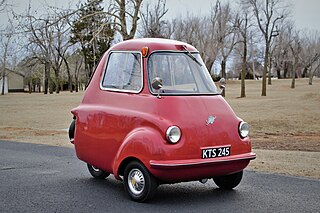
Scootacar was a British three-wheeled microcar built in Hunslet, Leeds by Scootacars Ltd a division of the railway locomotive builder, the Hunslet Engine Company between 1957 and 1964.

A bike-engined car is a small or light weight car that is powered by an engine that was designed for use in a motorcycle.

West Marine Ltd. was a wholly owned subsidiary of the Peel Engineering Company, which was founded by designer, inventor and engineer Cyril Cannell in the early 1950s to make Microcars and GRP boats and other fibreglass products.
The Peel Manxcar was a prototype 2+2 seater saloon car designed by Cyril Cannell and Henry Kissack and manufactured in 1955 by the Manx Peel Engineering Company. The projected purchase price of the assembled Manxcar was "....ten shillings short of £300, including purchase tax." Initially renamed from "Peel Manxman" because of the Excelsior (Coventry) motorbike of the same name, the Manxcar never entered standard production.
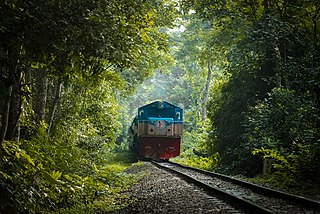
The automotive industry in Bangladesh is the third largest in South Asia.
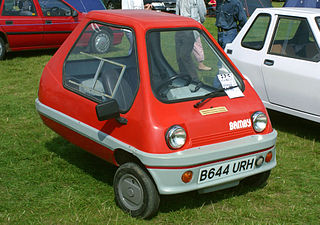
Bamby Cars was a British-built marque of microcars produced in small numbers in Hull, England, in the early 1980s. Bambys were designed and built by Alan Evans, who manufactured a one-off replica of the Peel P50 which also served as a prototype for further production.

















